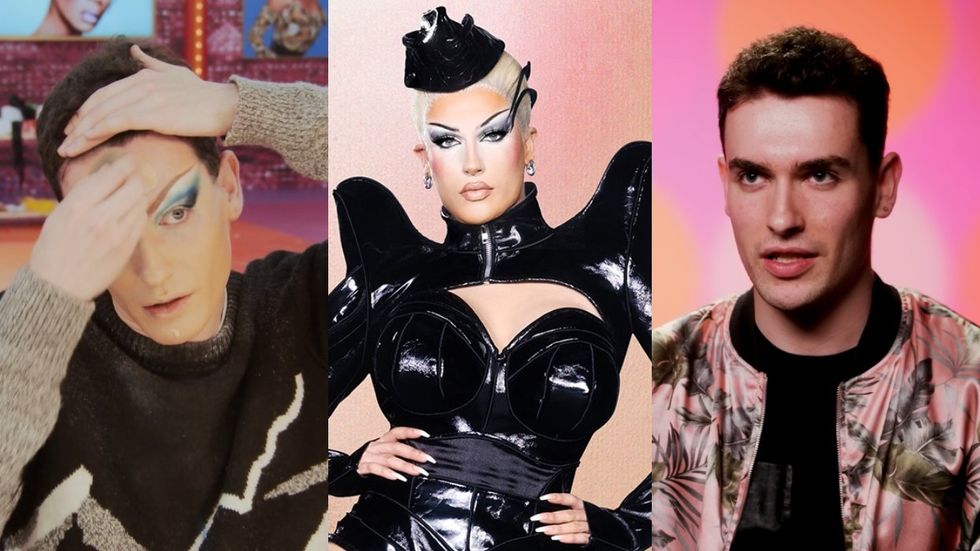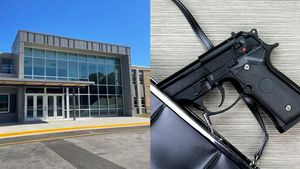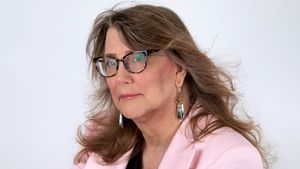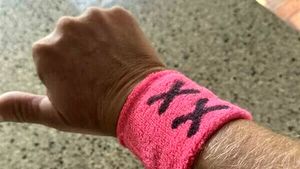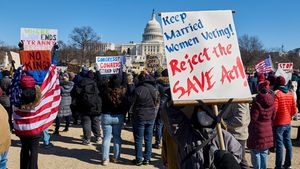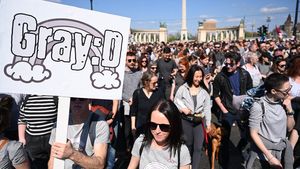“The shade of it all” took a sharp turn in episode 6 of RuPaul’s Drag Race season 16.
As recently as Dec. 2023, the Human Rights Watch (HRW) organization reported on a ruling from Russia’s Supreme Court determining that “the ‘international LGBTQ+ movement’ is an ‘extremist organization,’ jeopardizing all forms of LGBTQ+ rights activism in the country.”
This week, Out’s sister publication The Advocate reported on the case of a woman in Russia “sentenced to five days in custody for the crime of wearing earrings with Pride colors.” Out’s other sister publication, PRIDE, also reported this week on two female TikTokers in Russia who had to publicly apologize for a video of them kissing.
Plane Jane, a contestant of Russian-Jewish heritage, opened up during episode 6 about her personal experiences with the long-standing, ingrained homophobia that still permeates Russian culture and its people.
As the season 16 queens got ready for the maxi challenge, they reminisced on their experiences playing with dolls as young kids. “My dad took my dolls away and said that ‘only nasty disgraceful f****ts play with dolls,’” Plane told Xunami Muse in the episode. “One day I remember coming into my room and seeing that my dolls got replaced with fire trucks. It was made very clear to me at a young age, even though I wasn’t quite aware of what homosexuality was, that the effeminate wasn’t good.”
She then commented on the overall stance that her family had regarding queer people, “Listen, I don’t blame my dad. My dad’s a Russian Jewish immigrant. Russia is a very homophobic country. It’s hard to sort of just move past that signal. We grew up in a Russian immigrant circle, essentially. I wasn’t afforded the luxury of feeling that my parents would accept me no matter what, just because of the way that Russian culture is.”
“I feel like the reason why I have such a critical eye for drag, and the reason why I’m oftentimes so harsh, is because of my parents,” Plane added. “I’m so acutely aware of how they perceive drag, which is: they don’t value it at all. If I get the sense that somebody’s not up to par, I kind of devalue their drag in my mind.”
“Russians are very critical individuals,” she concluded. “There are none of those polite pleasantries that you [have] in American culture. It’s a lot more blunt, and that’s part of who I am as well. At the end of the day, I do have these deep-rooted insecurities that are really hard for me to shake.”

MTV
Drag Race season 9 winner Sasha Velour wrote about her own experiences with Russian culture and the country’s attitude toward the LGBTQ+ community in her 2023 book The Big Reveal: An Illustrated Manifesto of Drag. Upon moving to Moscow on a Fulbright fellowship, Sasha learned that political activists in the Russian LGBTQ+ community were just trying to “survive” and “couldn’t fathom what they were doing was artistic, because art to them was an institution for the rich and straight.”
“Despite Russia’s anti-LGBTQ+ laws and restrictions, there were gay bars and drag shows all over,” Sasha explained in her book. “While I was there, I even went to the premiere of a blockbuster film about drag (Veselchaki) and attended a gay film festival, poetry readings, and even rallies. Russians have told me that their culture is always ahead of the time and behind it at once. I saw this play out before my eyes — not least of all in the way Russian men all had iPhones and were on Grindr before the gays in New York!”
While conducting her research, Sasha identified that two sectors of the LGBTQ+ community in Russia had been “actively infighting.” One was described as a group of people with job securities and privileges that allowed them to throw Pride parades in the country. The other sector looked more like a network of working-class activists caring for the more vulnerable queer people in the community, tending to issues such as HIV care and proper housing.
“These two disparate groups agreed on one front: their criticism for the wealthiest gays, closeted executives, and celebrities in entertainment and media who saw no need for cultural and systemic change,” Sasha wrote. “Those who have been treated well under oppression often don’t want to change the system. Perhaps they worry that they would be worse off if everyone else had the same freedoms they did, or they don’t want their carefully positioned visibility to be compromised by asking the institutions of power to change and include everyone. Although the Russian activists saw America as being far ahead of them in the struggle for gay rights, I realized we had many of the exact same divisions.”
While competing on Drag Race season 9, Sasha Velour had already been outspoken about her time living in Russia. Now, viewers are also getting to learn about Plane Jane’s first-hand experiences dealing with Russian homophobia even among family members.
RuPaul’s Drag Race season 16 airs every Friday on MTV.
